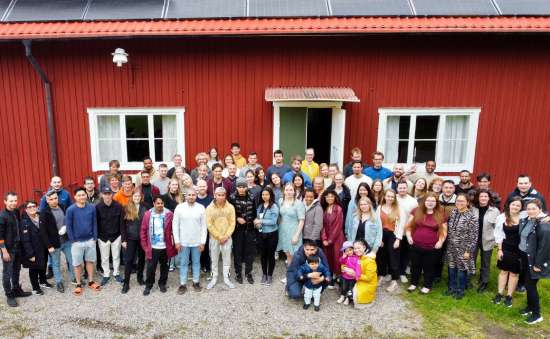What Do Adventists Offer for Young Adults?
In recent years, the age group often classified as “young adults” has been trickier to engage. It’s been a significant concern for Christian churches around the world. Though interestingly enough, similar observations regarding young adults have been coming up in conversations about the economy, the entertainment industry, politics, and more.
We could discuss the likely causes for this disengagement until we’re blue in the face. But most research agrees that these young people, aged 18-35, often report feeling lonely, misunderstood, and/or frustrated with the status quo. They also long for community and acceptance.1
That’s why the Seventh-day Adventist Church makes it a priority to understand and cater to the unique needs of today’s young adults in the volatile, digitally-focused, social-media-saturated society we live in.
Generational differences are inevitable, so our methods will be ever-adapting. But here’s a look into what the Adventist Church does to help young adults have a place to belong and a place to serve with their gifts.
We’ll go over:
- What are young adult ministries
- The history of young adult ministries
- Benefits of young adult ministries
- How to find young adult church groups or programming
Let’s get started.
What are young adult ministries?
 As of recently, young adult ministries focus on the age group and stage of life that begins in the later years of college, or as a young person is becoming independent. This usually ends up covering the ages of 21-30.2
As of recently, young adult ministries focus on the age group and stage of life that begins in the later years of college, or as a young person is becoming independent. This usually ends up covering the ages of 21-30.2
The official mission of young adult ministry in the Adventist Church is:
“The engagement and salvation of young adults through Jesus Christ. We understand this ministry to be that work of the church that is conducted for, with, and by young people.”3
Although there are official resources and programming from the General Conference,4 or the World Headquarters of the Seventh-day Adventist Church, most young adult ministry options are organized and operated on the local level, because the size and needs of this age group can vary so much depending on location and community type.
For example, the North American Division (NAD) has a ministry called the Adventist Christian Fellowship.5 Their goal is for Adventist college students to witness at public colleges.
And at individual church locations, you might find:
- Young adult Sabbath school groups
- Young adult Bible study groups
- Interest-based activity groups (biking, hiking, board games, book clubs, etc.)
- Hobby-based activities (drawing, knitting, or cooking)
- Community service projects (food donations, distributing Christian literature, homeless feeding, Habitat for Humanity, etc.)
- Stage-of-life activities or events (parenting groups or classes, marriage encounter events, financial planning seminars, etc.)
- Mission trips (like this mission cruise!)
Overall, these programs help young people grow spiritually as they befriend and serve others.
How young adult ministry started in the Adventist Church
The first young adult ministry was created in 1879, when two teenagers formed the Adventist Youth Society.6 Henry Fenner and Luther Warren saw the need for a community of believers to uplift and guide each other to Christ.7 This group ministered to both Adventists and non-Adventists—joining them together in Bible study, worship, and fun activities.8
In 1907, the Adventist Church formally created a ministry called, “Young People’s Society of Missionary Volunteers.”9 But by 1979, this name was shortened to “Adventist Youth.”10
Today, however, the phrase “Adventist Youth” refers to ministries for high school-aged kids. Whereas the ministry for 20-35-year-olds is now called Young Adults, or YA—a category that is relatively new not just in the church realm, but in society as well.11
But you still might find some longer-running young adult programs to still use the term “youth” to refer to any ministry for people 35 and younger.
The Adventist Church uses the young adult ministry program to:
- Encourage young adults to strengthen their relationship with Christ as they establish their independence
- Empower them to be leaders or difference-makers among their peers (and the church as a whole)
This ministry has involved youth leadership training from the very beginning. The Bible reaffirms that the youth shouldn’t be underestimated (1 Timothy 4:12).
In fact, many of Adventism’s early founders started God’s work in their late teens and twenties.12
History has proved that when it comes to serving God, age isn’t an issue!
Benefits of young adult ministries

Photo by Brooke Cagle on Unsplash
Young adult ministry programs can help strengthen people’s relationships with Jesus as well as with others. It can also provide support and community during a time of life when you’re just beginning to establish your household, your career, your family, or even your identity as you consider your place in today’s world.
These ministries seek to do that by:
- Helping develop a Christian character
- Teaching how to witness and serve, as life presents more opportunities than when you were younger
- Helping maintain a Christ-centered life (prioritizing responsibility to Christ over worldly responsibilities)
- Establishing a Christian community focused on belonging, support, and encouraging one another
Because if anyone needs a tight-knit community of fellow believers, it’s young adults.
On top of solidifying their professional identity, young adults are at the stage where they start to assess the effectiveness of their upbringing, especially when it comes to their beliefs. For the first time in their lives, they may be left to make significant life decisions on their own. And one of the most critical decisions is deciding whether to join a church or not.
They’re trying to ask themselves why they believe what they do—or why they attend church. Those born into the church often begin with what’s referred to as “adolescent faith.”13 They are used to accepting the teachings of their parents and authority figures without much question.
But there comes a time when young adults must choose to do those things because they have internalized their beliefs—not because they’re being told to.
And as young adults start to evaluate their beliefs, they look for a support system. They’re looking for people to gently guide them to the truth. They’re looking for peers to connect to.
But sometimes, well-intentioned churches get caught up in preaching doctrine while neglecting fellowship and friendship.
Questioning one’s long-held beliefs can be a frightening experience. So young adult ministry aims to provide a welcoming environment where young people can navigate life’s questions with Bible principles. Their mission is to provide young adults with authenticity, belonging, compassion, and discipleship.14
How to get involved in local groups
 If you’re a young adult and looking for something that could be helpful for you at this stage of life, you can first start by looking up the nearest Seventh-day Adventist Church. Their website or social media page is likely to have information about their different Bible study groups and ministries.
If you’re a young adult and looking for something that could be helpful for you at this stage of life, you can first start by looking up the nearest Seventh-day Adventist Church. Their website or social media page is likely to have information about their different Bible study groups and ministries.
If nothing else, joining a group can give you the chance to meet other people interested in serving God and making the most of their lives. It’ll give you a chance to connect with people who face the same challenges as you. (Not to mention it can also be a great place for fun activities and good food…)
And if you’re the kind of person that has a passion for serving young people, you could get involved, too! Get started by deciding what your passion for service or ministry is. You can serve multiple ministries, of course, but it helps to narrow it down. And it’ll help your search be more specific.
But the most important thing you can do is get started. Make the first step, and pray that God will help you take it from there. He can lead you to a group or a ministry that best fits your needs and aspirations.
Find more information and resources about young adult ministries and programming:
- Worldwide Young Adults ministry for Adventists
- Adventist Christian Fellowship for public college campuses
- Keep up with the US Adventist Youth & Young Adult Facebook page
- Adventist Youth ministries in multiple divisions of the worldwide church:
– North American Division
– Inter-American Division
– South American Division
– East-Central Africa Division
– West-Central African Division
– Southern African-Indian Division
– Inter-European Division
– Trans-European Division
– Northern Asia-Pacific Division
– South Pacific Division
– A quick-start guide for young adult ministry initiatives
– Adventist Young Professionals network
Related Articles
- Earls, Aaron, “8 Reasons Young Adults Leave Your Church (and 8 Reasons They Stay)”. [↵]
- https://www.gcyouthministries.org/ [↵]
- https://www.gcyouthministries.org/ministries/young-adults/mission-aim-motto-and-pledge/ [↵]
- https://www.gcyouthministries.org/ministries/young-adults/ [↵]
- “Adventist Christian Fellowship”. [↵]
- Seventh-Day Adventist Pastor’s and Elder’s Handbook for Youth Ministry, page 10 (The General Conference of Seventh-day Adventists, 2002). [↵]
- Ibid [↵]
- Ibid [↵]
- Ibid [↵]
- Ibid [↵]
- “Young Adults.” [↵]
- “Youth” in adventist.org, Seventh-day Adventist World Church, Accessed July 26, 2022. [↵]
- Russell, Gary, in Ministry Magazine: “Young adult ministry: let the baby-sitting cease”. [↵]
- Institute of Church Ministry: “Loving and Leaving: SDA Youth Attitudes and Behavior to the church”. [↵]
More Answers
Do Seventh-Day Adventists Have “Rules” For Clothing?
Many religions have guidelines on dress, but what about the Adventist Church? Discover how Adventists choose to dress based on biblical principles.
11 Reasons People Become Seventh-day Adventists
Curious why many people become Adventists? Here are elements of Adventist beliefs, values, and mission often reflected in people’s decisions to join.
What’s the Seventh-day Adventist General Conference Session?
At the General Conference Session, Adventist delegates from around the world gather to assess the state of the organization, pray, and discuss current issues. Here’s how it works.
How Adventists View the End of the World
The end of the world is no fun to think about. But here’s how we can actually find hope and comfort in what’s to come.
What Is an Adventist Medical Missionary?
A medical missionary in the Adventist Church is someone who cares for the medical needs of people as a way of showing the love of Jesus. They may travel to another country, or even just serve in their hometown.
Is the Seventh-day Adventist Church Protestant?
Learn how the beliefs of the Seventh-day Adventist Church align with the “5 solas” of Protestantism.
Are Seventh-day Adventists Evangelicals?
According to its origins and definition, evangelicalism is about following Jesus and the Bible and sharing the Gospel through the way we live our lives. Adventists wholeheartedly harmonize with these principles.
Could Anything Keep Me from Becoming an Adventist?
We are each saved through Christ. But when it comes to church membership, are there certain beliefs or expectations to become an Adventist?
Do Seventh-day Adventists Have “Rules”?
We uphold principles we believe will help us maintain a closer relationship with Jesus and His Word. Learn how these principles guide Adventist lifestyles.
Do Seventh-day Adventists Have “Rules” For Marriage?
Around the world, many cultures and religions have various marriage traditions, expectations, or even rules when it comes to choosing a partner, planning the wedding, extended family logistics, or a number of other things.
Can a Seventh-day Adventist Marry a Non-Adventist?
Yes. Seventh-day Adventists are not under any official rules that dictate who they can or cannot marry. This is a personal, life-altering decision between the couple and God.
What Adventists Believe About Alcohol and Tobacco Use
The Seventh-day Adventist Church has historically discouraged the use of alcohol and tobacco. Even before the church started in 1863, its leaders were realizing the negative effects of these substances.
Jewelry—Why Do Many Seventh-day Adventists Choose Not to Wear It?
If you walk into a Seventh-day Adventist church service, you might notice that many people aren’t wearing earrings, bracelets, necklaces, or sometimes even wedding rings.
International Pathfinder Camporee
Youth aged 10-15 in the Adventist Church’s global Pathfinder program look forward to the International Camporee every 5 years. This event brings together Pathfinders from around the world for exciting activities.
How Adventists interpret Bible prophecy
Bible prophecy conjures up a variety of emotions in people. For some, it feels exciting or mysterious.
Moviegoers’ Guide to The Hopeful: The Facts Behind the Film
Learn where and when you can watch The Hopeful and how to get tickets. Already seen it? We’ll uncover the real story that inspired this film.
How Are Seventh-day Adventists Different from Other Protestants?
As a Protestant Christian denomination, the Seventh-day Adventist Church regards the Bible as the ultimate guide and looks to Jesus Christ as the only way to salvation. We do have some differences of belief or interpretation when it comes to topics like Bible prophecy, end-time events, the Sabbath, and a person’s state after death.
How Adventists Handle Death and Funerals
Most Seventh-day Adventist funeral services are similar to those of other Protestant denominations, such as Methodists, Baptists, or Presbyterians, but you might find a few differences or unique nuances.
Adventist Culture
Many Seventh-day Adventists adhere to specific lifestyle principles that can make them stand out from those in other Christian denominations. Whether it’s going to church services on Saturday or eating the popular Adventist entrée of “haystacks.”
Do Adventists Observe Easter-Related Holidays?
Jesus Christ’s resurrection, celebrated on many Easter-related holidays, is central to the beliefs of the Seventh-day Adventist Church. And that means we seek every opportunity to remember it.
An Overview of Seventh-day Adventist Higher Education
The Seventh-day Adventist Church has about 118 tertiary schools around the world. Though many of them are within North America, you’ll also find Adventist universities in countries across the world—places like Croatia, Austria, Brazil, Madagascar, and the Philippines.
The Ten Commandments from a Seventh-day Adventist Perspective
Ever eaten a salad and gotten a big piece of green stuck in your teeth? And you didn’t realize it was there until you looked in the mirror? (Because no one ever told you!)
The Benefits of A Seventh-day Adventist Academy
Adventist academies are high schools (grades 9-12) that are owned and operated by the Seventh-day Adventist Church.
Are Seventh-day Adventists Christians?
Yes, the Seventh-day Adventist Church is a Protestant Christian denomination formed in 1863. Just like other Christians, we believe that Jesus Christ is our Savior and seek to follow the principles of the Word of God.
Adventist Movies: Where Faith and Film Meet
The Adventist Church uses film to share our faith and uplift positive values. Learn more about specific Adventist-produced films and where to find them.
Do Adventists Celebrate Christmas?
In general, most Seventh-day Adventists do celebrate Christmas.
Since our denomination doesn’t have specific guidelines about holidays, it’s up to each member to decide whether to celebrate it based on their personal convictions and study of the Bible.
What Does the Bible Say About Modesty
Seventh-day Adventists and Christians in general try to ensure their outward presentation and lifestyle glorify God. This often involves daily habits like the ways we hold conversations, the ways we dress and accessorize, and the ways we regard other people when we’re out and about.
How Do Adventists Make Movie and Music Choices?
How do Adventists decide what music to listen to and which movies to watch? Learn how Bible principles can help us make better entertainment choices.
Does the Seventh-day Adventist Church Believe in Paying Tithe?
Seventh-day Adventists believe in paying tithe and offerings based on the biblical command and our commitment to being wise stewards of God’s resources. These donations help fund the mission of the Adventist Church by supporting pastors, missionaries, church expenses, and evangelistic projects, among other things.
Didn’t find your answer? Ask us!
We understand your concern of having questions but not knowing who to ask—we’ve felt it ourselves. When you’re ready to learn more about Adventists, send us a question! We know a thing or two about Adventists.































